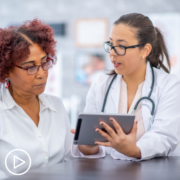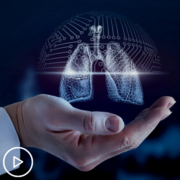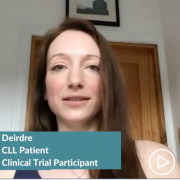What You Should Know When Making a Lung Cancer Treatment Decision
What You Should Know When Making a Lung Cancer Treatment Decision from Patient Empowerment Network on Vimeo.
What should you consider when choosing a lung cancer therapy? Dr. Jessica Bauman, a lung cancer specialist, reviews factors that determine which lung cancer treatment may be most appropriate for your disease.
Dr. Jessica Bauman is assistant professor in the department of hematology/oncology and as associate program director of the hematology/oncology fellowship training program at Fox Chase Cancer Center in Philadelphia. Learn more about Dr. Bauman here.
See More From the The Pro-Active Lung Cancer Patient Toolkit
Related Programs:

|

|

Establishing a Lung Cancer Diagnosis: How Do Subtypes Affect Treatment Choices? |
Transcript:
Katherine:
How can patients advocate for a precise lung cancer diagnosis, and why is that important?
Dr. Bauman:
So, it’s, of course, important because it changes everything that they would be able to be offered in terms of treatment. And so, I think that it is important to, one, really understand what your lung cancer is, right? What is the stage? What are the treatment options? And if there are treatment options that are not options for you, why is that? And is that because of special testing that has been done? So, I think it’s always important to ask, “Are there other special tests that I need to have on my tumor or on the biopsy?”
And if patients have questions about what options that they have, I think it’s important for them to understand why some options are theirs, and why other options may not be good options for them, and how their physician is making those decisions. Because I do think the more you understand about this, the better you can advocate for the types of treatments you can access.
Katherine:
When deciding on a treatment approach with a patient, what do you take into account when making the decision?
Dr. Bauman:
So, we take into account all of the things that we’ve been talking about. Of course, the number one most important part is the histology, so what the kind of cancer is. Number two is what the stage is. And then number three is the health characteristics of that patient.
Do they have underlying health problems that would impact the types of treatment that we would consider? And then ultimately, what are the goals of the patient? Right? So, of course, we have lots of different options, but it’s going to be important to partner with the patient and their family to understand where they are in their life and what kinds of treatments are feasible and acceptable to them.
Katherine:
What about treatment side effects? Do you take that into consideration?
Dr. Bauman:
Absolutely. So, I always talk about my two primary goals for when I’m treating a patient is 1.) is to help them live as long as they can, and Number two is to help them live as well as they can. And I do think it is critical to understand the side effects of our treatments and how that may impact the patient and what their underlying issues are. So, for example, if I have a patient who comes to me who already has significant neuropathy because of a prior diagnosis of some kind, we need to strongly consider the types of treatments we’re using to consider one that doesn’t cause neuropathy.
Right? And often there are different treatments that we have where we can really consider the side effects and quality of life for patients in terms of what we have. I’ll also say that treatments and the supportive care that we have to offer have become better over time. So, yes, of course, we give toxic treatments, but we definitely are able to support people better with the side effects that they have to try to minimize those and make it as tolerable as we can.



![Spanish [ACT]IVATED NSCLC Veterans Resource Guide](https://powerfulpatients.org/wp-content/uploads/Spanish-ACTIVATED-NSCLC-Veterans-Resource-Guide-180x180.png)






